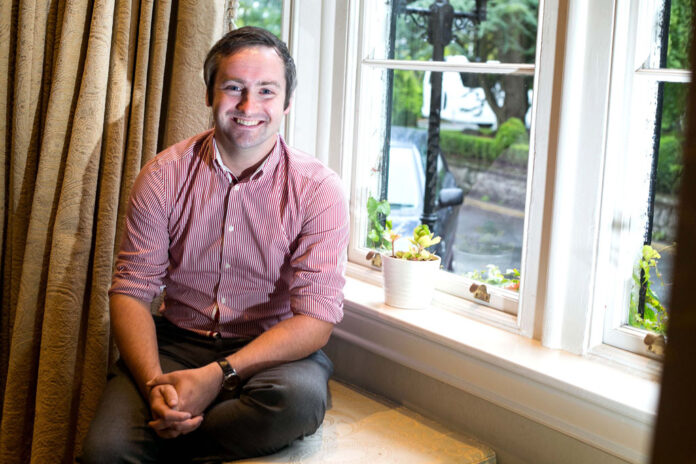FIANNA Fáil was among Europe’s most consistently successful political parties until its bubble burst rather spectacularly and the 71 Dáil seats it held going into the 2011 General Election were just 20 afterwards.
While it can now be said, with some certainty, the party won’t disappear from the political landscape, it also looks very unlikely that it will hit the heights of the Bertie era for some years.
One of its major problems is that huge swathes of voters who would have regularly opted for Fianna Fáil, now see it as being the natural home of self-interested chancers.
While he doesn’t claim the Soldiers of Destiny were blameless in the crash, Eoin Neylon, who was abroad for three years himself due to the economic crisis, claims Fianna Fáil has turned a corner and is poised to be a different type of organisation in the future.
Presidency
After 10 years of activism, Eoin is running for the presidency of Ógra Fianna Fáil and is spending much of his time canvassing, prior to the election at the party’s National Youth Conference on November 8.
While many inherit their family politics, he says he doesn’t come from a staunch Fianna Fáil home. “I come from a very mixed family background, members of my family are in Fianna Fáil, Fine Gael, non-party, a sister of mine voted for the Greens for a few years. There was never an expectation of anyone to go into a political party but there was always a discussion about politics or the issues of the day, there was always that interest.
“When I went to NUI Galway I was going around the Fresher’s Fair and I got talking to the different political parties that were there. I suppose it was the Fianna Fáil guys that really engaged me and they seemed to have many of the values I held. I went to a few meetings, got more involved and it rolled from there. The more I got involved, the more I got to see that being involved on the coalface is the only place to be if you want to have your voice heard. Too many people think that sitting on a bar stool is where to have your discourse.”
A structural engineer, he spent three years in Britain following the collapse of the construction industry here. “I was in London for two years and Scotland for a year. It was completely and utterly down to economic reasons, it wasn’t a choice, I’d much prefer to have stayed around. Don’t get me wrong, I like travelling but I don’t like living away from home.”
Malaise
He says Irish politics is, to a large extent, trapped in another era, while many voters want a major change of direction. “I think we’re still under the malaise of the Haughey era. This present Government are no different and the last week [he spoke to The Champion as the McNulty controversy was on the front pages] in particular, has shone a rather large spotlight on it. We’re still trapped in the politics of the 1980s. I think this generation, our generation, are really, really sick of it. We may have been born in the 1980s but we want nothing to do with politics of the ’80s which have hung around.”
Of course, Haughey was a hero in his party, as was Bertie Ahern, even if few in Fianna Fáil want to mention two of their most successful leaders now.
When Eoin got involved in Fianna Fáil, Ahern was still in charge and, despite the revelations about his labyrinthine finances and the ultimate failure of the economic policies pursued, which were a factor in his own emigration, he didn’t lose faith in the party.
“I didn’t. I got very annoyed, very angry, a sentiment shared by every Fianna Fáil member. They were very let down, particularly with the revelations about Bertie Ahern. To be fair to Bertie, he’s a very charismatic, charming individual who always talked a good talk but when the revelations about his conduct came out, it was a body blow. A lot of members felt betrayed, very let down, by that.”
Quite often, there’s a fair bit of idealism among people who get involved in politics at a young age and a bit of that is apparent when he speaks about what he would like to see in politics.
“We can all throw around buzz words like fair society that mean nothing. At the end of the day, if you have a society that has equality of opportunity, gives access to education, gives equality to every citizen in front of the law, that doesn’t discriminate on the basis of superficial ideas between citizens of this country, once you set down that foundation, from then on society will find itself on the right course.
“There’s not enough empowerment of local communities to sort themselves out and their own individual issues. There’s too much centralisation of power into a very small part of Dublin 2 to allow the country to develop in a natural way that will bring all elements of society along with it. That’s where Fianna Fáil need to be, to go back to the old Lemassian style of empowering communities and of allowing industry to right itself. If an industry falls down, or is in specific need, that’s the time for central Government to step in, not trying to control a million variables in various industries at once, which is impossible.”
Again, he feels that Ahern bears some responsibility for concentrating power.
“I blame Bertie Ahern for a lot of the centralisation, he’s the person that really started it. It was easy for him at the time, the foundations of a good economy were there, we were all on the up, there was massive new infrastructure and when things were going so well, it’s very easy to say ‘Leave me in charge of it, I’ve got this covered’. When it all became too much and it overheated, you can see what centralisation meant. None of us really saw what was coming, only a small group of people could have and they didn’t do enough to stop it or to brace the country for it.
“There were external factors, but there were a lot of internal factors that could have been changed or altered to make the cascade of financial crises hitting our shores much more bearable.”
Micheál Martin
While Ahern may be persona non grata now, what about Micheál Martin, who served at cabinet level throughout the Ahern years, who was a senior figure in a government that lost national sovereignty?
“To be fair to Micheál Martin, he has introduced a lot of changes in the party. Is the party perfect? No, definitely not. I don’t believe any political party can be. We’ve changed our own mechanisms of how we do business internally in the party and there were massive teething problems with that. It was quite public around the time of the local elections but these are things we have to get right, with a much smaller pool of people in the background running things behind the scenes. We’re very much dependent on local volunteers at this stage to try and run our own affairs. From that perspective, we’ve had a massive cultural change in our party. I don’t think that would have been possible with a completely blank slate, there had to be some transition and Micheál Martin has been the best person to transition from what we were, to what we should be.”
He feels Fianna Fáil is a changed party, having responded in the right way to the hiding it took in 2011. “College recruitment this year has been massively up, it shows it’s a party that’s righting itself. I think Micheál Martin has publicly, on behalf of Fianna Fáil, accepted a lot of the wrongs, bad decisions and mistakes. I think if you look at it, on balance, across all the parties, there was a big lesson taught by the electorate to the body politic in the election of 2011 and there are many political parties who did not hear the voice of the people at that time who were saying ‘We want a change of culture, a change of how politics is done in this country’.
“Very few political parties have actually heeded what was roared at them in 2011. Fianna Fáil, and you can call me biased but I know it from the coalface, very much have heard the voice of the electorate and responded very, very well, I believe.”
The opportunity to advance things in the direction he feels they should go, is enough to keep him involved in politics, he says.
“There have been times over the last 10 years when I’ve gotten frustrated with it, I won’t deny that. There were times when I wondered what am I doing here at all. But then there are days when you can actually see the positive influence you are having and you get feedback that you’ve genuinely helped someone along. They are the days that spur you on to keep going.
“At the Ard Fheis in 2012, I got up to speak on a motion on same sex marriage. It was ourselves, Clare Ógra, who put it forward. There were speakers for and against, on both sides. I was expecting a tight vote but there was overwhelming support on the day. To see that passed, see it on the news and then to get calls from friends in the LGBT community saying we don’t get this positivity enough, we need people like you involved in politics to get this on the agenda, those days make it worthwhile.”
Owen Ryan
Owen Ryan has been a journalist with the Clare Champion since 2007, having previously worked with a number of other publications in Limerick, Cork and Galway. His first book will be published in December 2024.


